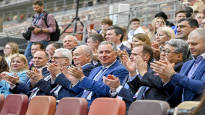There is currently a fierce debate going on around the world about the participation of Russians and Belarusians in next summer’s Paris Olympics.
While the international community is debating whether to allow Russians and Belarusians into Paris, leading Russian politicians and sports bosses are waging their own propaganda battle.
One of the “culminations” of that struggle was witnessed in September in Moscow at the premises of the Russian Olympic Committee.
The Russian sports administration organized a large-scale event with the country’s top athletes discussion session on the Olympics. The event was chaired by the chairman of the Russian Olympic Committee Stanislav PozdnyakovDeputy Minister of Sports Alexey MorozovChairman of the Olympic Committee of Belarus Viktar Lukashenka and the president Vladimir Putin assistant By Igor Levitin.
In its brevity, the core message of the politicians and sports bosses was that athletes should not pursue their Olympic dreams if and when the price is so-called neutral status.
The International Olympic Committee IOC has recommended to sports federations to allow Russian and Belarusian athletes who do not support the war in Ukraine and who have no connections to the military or intelligence services to compete. The recommendations do not apply to the Olympics, but the participation conditions are likely to be similar.
The president of the Russian Olympic Committee, Pozdnyakov, described the athletes as being subjected to a humiliating neutralization process if they decide to go to Paris when the opportunity arises. According to the chairman, the safety of athletes in hostile Western countries cannot be guaranteed.
Sports bosses also highlighted economic factors. According to Pozdnjakov, the Olympic Committee cannot support the athletes going to Paris. Instead, those who miss the Paris Games will receive monetary compensation.
The sports management enthusiastically markets the Friendship Games, which are a substitute for the Olympics developed by the Putin administration. Teams from Asia, Africa and South America have been invited to the event to be held in Moscow and Yekaterinburg in September, but there is no information yet on the possible participants.
The state administration has promised to pay the medalists of the Friendship Games the same prize money that has been paid to Olympic medalists in previous years.
The comments of those in power have made the spirit of the game clear. In practice, Russian athletes have two options if they are accepted to Paris in a neutral status:
1) To go to the Olympics without any guarantee of financial support and to be exposed to criticism and accusations of betrayal in his home country.
OR
2) Stay at home with full state support, aim for prize money from the Friendship Games and be a hero in the eyes of those in power.
Return to Soviet times
The neutral status has become a red garment for many of those who hold power in Russia, although competing without national emblems has become familiar to the athletes of the eastern neighbor due to doping scandals.
Neutral Russian athletes are still seen in some sports (e.g. tennis and judo), but a growing number of sports bosses have begun to consider the conditions of participation too humiliating.
Among other things, the chairman of the Russian Ski Federation Jelena Välbe has announced that the members of the national skiing team will no longer participate in international competitions as neutral athletes. Välbe, who supports Putin, is one of the decision-makers who have toughened their speech due to the war started by Russia in Ukraine.
– The Russian government has made it clear that Russia is not only at war with Ukraine, but with the entire Western world. Sports have been included in this warfare, well-versed in Russian sports of Tribuna.com media director Dmitri Navosha said to Urheilu.
Already in 2015, the ministry-led doping program revealed that individual athletes are pawns for Russia’s political leadership. With the offensive war that started in February 2022, the role of the marionette has only strengthened.
Putin’s administration has not hidden its desire to return to the Soviet era in the field of sports. The president has recently expressed his displeasure with the transfer of talented Russian hockey players to the NHL, proposed the return of athlete parades familiar from Stalin’s times, and encouraged the development of the above-mentioned Friendship Games.
The individual freedoms, goals and career dreams of athletes will be even more subordinated to the wishes of the state leadership in the future. Researcher familiar with Russian history Pia Koivunen The University of Turku described the situation as sad from an individual’s point of view.
A superpower in danger
Russian athletes who publicly criticize the system are rare, but a few critical statements have been embarrassing for Putin’s administration.
NHL defenseman Nikita Zadorov the interview published in September was the latest blow. With millions of viewers on video the top player strongly condemned Russia’s war in Ukraine and the system that oppresses people, of which athletes are also hostages.
Those in power don’t want to hear any more about new Zadorovs, or in general about any Russians who say no to the war that has been going on for more than 1.5 years.
That’s why many sports bosses prefer to see their athletes at home in lower division level competitions than at the Olympics among the world’s best. Neutral status and distance from the administration’s activities fit poorly with the image of a strong superpower.
Stanislav Pozdnjakov, chairman of the Olympic Committee, recently stated that Russia’s next big goal is the 2028 Olympic Games, because “by then the sanctions will definitely be gone.”
It says that the Russian sports leadership does not count on Paris at all.
Sources: Sports.ru, Tribuna.com, Play the Game, Sport Express
